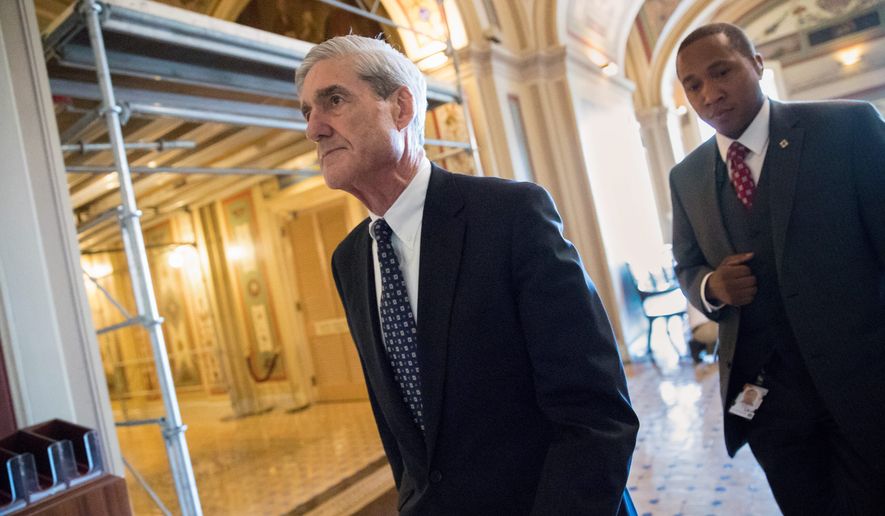Just as President Trump has begun easing off his attacks on special counsel Robert Mueller’s investigation into Russian meddling in the 2016 presidential election, Senate Judiciary Committee members next week will consider two partisan-backed bills aimed at shielding the probe from the White House.
How heated the debate becomes over the president’s authority to dismiss Mr. Mueller should serve as an indicator of Capitol Hill’s appetite to check Mr. Trump’s executive powers before the midterm elections.
“I haven’t made up my mind if I’m going to be for a bill or not,” committee chairman Chuck Grassley told The Washington Times on Wednesday. “I agreed to have the hearing because of all the questions that can be raised about whether the special counsel can be fired or not.”
Congressional leaders, constitutional scholars and Washington’s brightest legal minds have hotly debated the subject ever since Mr. Trump fired FBI Director James B. Comey in May and the Justice Department appointed Mr. Mueller as special counsel to lead its Russia-related investigation.
For months Mr. Trump has inflamed the debate, regularly questioning the neutrality of the Mueller probe, characterizing the former FBI director’s friendship with Mr. Comey as “bothersome” and generally keeping Washington guessing. When asked directly whether Mr. Mueller should step down, the president has said, “We’re going to have to see.”
He also lashed out after learning the special counsel is scrutinizing his family’s financial history.
But the anti-Mueller rhetoric has recently cooled. Even this week’s revelations that Mr. Mueller’s investigative team used strong-arm tactics when raiding the home of the president’s longtime confidante and campaign chairman Paul Manafort has thus far failed to ignite the normally volatile Trump Twitter feed.
There’s also the matter of Mr. Trump leaving the FBI alone. Mr. Comey’s replacement, FBI Director Christopher Wray, used the occasion of his first public appearance since taking the job to clearly point out the White House is far from the agency’s ongoing Russia probe.
“I can say very confidently I have not detected any whiff of interference in that investigation,” Mr. Wray said earlier this month at a gathering of intelligence community leaders in Washington.
Both Mr. Trump and Capitol Hill lawmakers could also be wary of public perception. Last month a poll in 99 congressional battleground districts — which Republican lawmakers primarily control — showed voters two-to-one against Mr. Trump removing Mr. Mueller.
The bills to shield Mr. Mueller from Mr. Trump, which Senate Judiciary Committee members will examine and discuss next week, have bite.
One, introduced by members Thom Tillis, North Carolina Republican, and Christopher A. Coons, Delaware Democrat, would allow a special counsel to challenge any dismissal in court before a three-judge panel. If the judges find no “good cause” for the action, the special counsel would be reinstated.
The Tillis-Coons proposal is retroactive to May 17, which means Mr. Mueller is covered. It also clarifies that only the DOJ’s most senior member could fire the special counsel.
Sens. Lindsey Graham, South Carolina Republican, and Cory A. Booker, New Jersey Democrat, have another proposal based on an opposite logic. Their bill requires the top DOJ officials tasked with dismissing a special counsel to clear the move with a judicial panel before the termination. That way reasons for the firing would be on record.
Mr. Grassley has not dismissed calling the bills up for a vote, but has made it clear he seeks to hear opinions before making that decision.
Committee members pushing their Mueller-shield legislation say it’s a sign Capitol Hill will battle Mr. Trump if he ever sacks Mr. Mueller.
“Any effort to go after Mueller could be the beginning of the end of the Trump presidency unless Mueller did something wrong,” said Mr. Graham, who served as a GOP impeachment manager against President Bill Clinton in the late 1990s.
If one of the Muller-shield proposals passes the committee, then passes the Senate, the House would still have to weigh in.
• Dan Boylan can be reached at dboylan@washingtontimes.com.




Please read our comment policy before commenting.